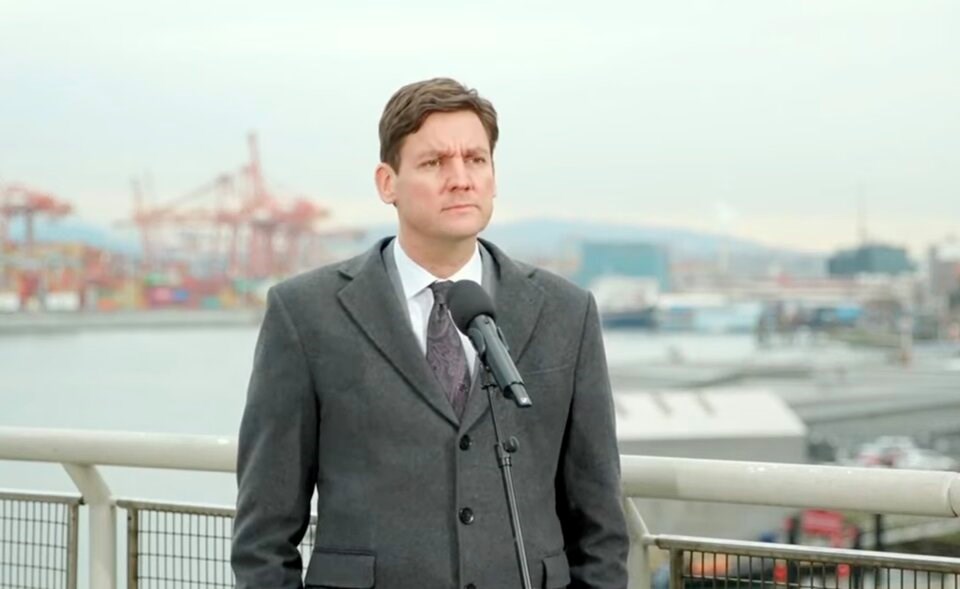It starts with Kentucky bourbon, spreads to peanut butter, and is accompanied by a splash of orange juice. The Canadian response to Donald Trump’s tariffs sounds like some sort of awful recipe by an influencer on Instagram. But it’s instead a carefully crafted mission to hit the Americans where it hurts.
Day by day, as we inch closer to a potential Feb. 1 tariff date, Premier David Eby and Prime Minister Justin Trudeau unveil more of the plan to hit back at the American president.
Not since COVID-19 have international events so completely overtaken the national and provincial political agendas as we now see with the Trump tariffs. The B.C. government is entirely seized by the issue, as ministers seek to cut spending, reach out to other international trade partners and batten down the hatches for the incoming economic storm.
“We’re going to respond to tariffs,” Eby said Tuesday. “Keep in mind, this is not a fight that we picked. And in fact, we think this is going to hurt Americans as badly as it does Canadians. But we’re going to stand up, we’re going to support federal efforts to respond with targeted tariffs to make sure that the Americans understand we will not surrender.”
The products Canadians could target were picked to target so-called “red states” where Republican allies of Trump hold power.
Peanut production is heavy in Georgia and Texas, bourbon in Kentucky, other American whiskey in Tennessee and orange juice in Florida.
They are, apparently, part of a $37-billion counter-tariff plan by Canada that could rise to as much as $110 billion if Trump refuses to yield.
“If there are unfair tariffs, we will respond robustly and we will be there to support Canadians and protect our interests,” Trudeau said. Ottawa is also signalling it could return some of the money it earns in counter-tariffs to hard hit businesses and individuals.
For Eby, the tariffs have overshadowed all else. At the opening press conference of the First Nations Leadership Gathering in Vancouver on Tuesday, Eby and Indigenous leaders were peppered with questions about Trump, the economic impact of tariffs and pivoting to build domestic natural resource projects like pipelines to ward off American influence.
The premier also announced a new task force of business, union and Indigenous leaders to refocus on “economic security” for the province at a time when it has lost its biggest trading partner.
“What President Trump has done has let us know that a partner that we've had for many, many years, that we trust, that we rely on, that's like family for us, can no longer be relied on,” said Eby.
“I, for one, will not allow British Columbia to stay in a position of being dependent on a partner that we can't count on.”
The provincial government will focus on diversifying trade to other countries, to try and lessen the impact of this, and future, disputes with the United States, said Eby.
It’s too bad New Democrats didn’t clue into the importance of diversifying trade earlier — say, before they shut down the B.C. trade offices in 13 Asian cities in 2019, arguing that they could save money if they cut staff while embedding services inside existing Canadian embassies.
Gone were dedicated British Columbia offices in Beijing, Shanghai, Guangzhou, Hong Kong, Tokyo, Seoul, Manila, Jakarta, Singapore, New Delhi, Mumbai, Chandigarh and Hyderabad. On-the-ground officials complained that then-ministers Bruce Ralston and Michelle Mungall had so badly botched the change that they were personally left with unpaid bills.
BC Conservative Leader John Rustad has said the NDP should re-open the offices if it’s serious about diversifying trade and standing out in a crowded international market. But Eby appears unmoved.
“Since I’ve been sworn in as premier, it’s been a priority to expand our trade presence and we’ve opened new offices in the Philippines, in Taiwan and in Vietnam,” he said.
“We continue to expand our presence in trade internationally.”
Diversification, though, is a longer game. In the short-term, the premier has raised the prospect of removing American alcohol (including California wine) from B.C. liquor store shelves, cutting government contracts to American firms and taxing supply trucks driving to Alaska.
Whether it’s enough to deter Trump, or even get his attention, is unlikely.
“It’s hard to know for certain what the president’s plans are,” said Eby. “They seem to change moment to moment.”
Everyone is left to respond, as best they can, to an erratic and ever-changing situation.
Rob Shaw has spent more than 17 years covering B.C. politics, now reporting for CHEK News and writing for Glacier Media. He is the co-author of the national bestselling book A Matter of Confidence, host of the weekly podcast Political Capital, and a regular guest on CBC Radio.



